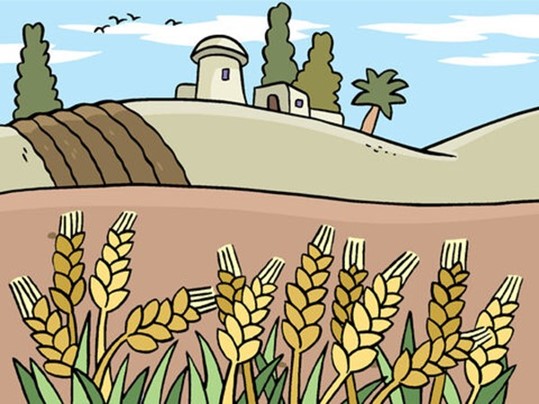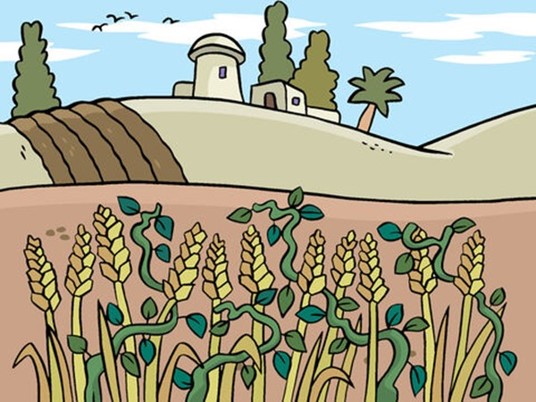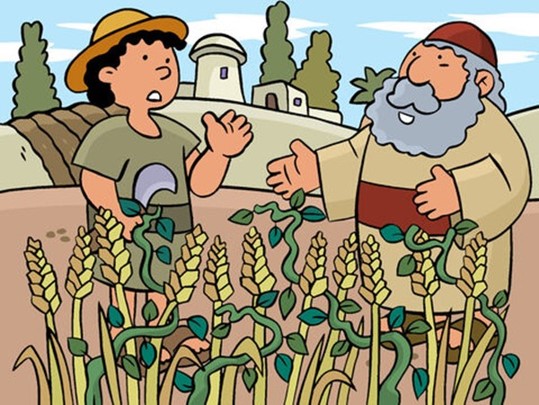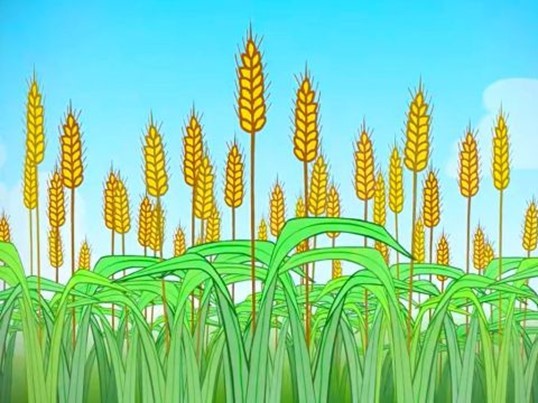Good morning!
Greetings in the name of the Father, the son, and the Holy Spirit.
Jesus told them another parable: ‘The kingdom of heaven is like a man who sowed good seed in his field. (Matthew 13:24)

Imagine standing in the middle of a vast, golden field on a warm summer’s day. The sun is shining, casting its light over the gently swaying wheat. There is peace, beauty, and promise all around you, a field full of life and potential. The wheat is growing strong and tall, nourished by the earth, reaching toward the sky. As you stand there, you might begin to think of the potential that such a field holds—the promise of a rich harvest, the abundance of food, and the provision it represents. But as you look closer, you notice something unexpected. Among the wheat, there are other plants— weeds, scattered and mixed throughout the field.
At first, they may be barely noticeable, growing subtly alongside the wheat, but as they mature, their presence becomes undeniable. They are entangled with the wheat, sharing the same soil and the same space. This field, once so perfect and pure, now seems compromised. It raises questions: Why are the weeds allowed to grow among the wheat? Why doesn’t the farmer remove them?
This image is not just a picture of a literal field, but a metaphor for the world we live in. In Matthew 13:24-30, Jesus uses this simple but profound story to reveal a deep spiritual truth. Just like the field, our world is full of both good and evil, both wheat and weeds. And yet, God, in His wisdom, allows both to grow side by side for a reason. This parable is not just about agriculture—it’s about how we live and how God sees us.

There Are Weeds in the World
The first fact that Jesus introduces in the parable is simple yet profound: here are weeds in the world. In Matthew 13:24-30, Jesus tells us of a farmer who sows good seed in his field, expecting a rich harvest of wheat. But during the night, while everyone is asleep, an enemy comes and sows weeds among the wheat. As the seeds sprout and grow, it becomes clear that both the wheat and the weeds are now growing side by side.
This detail about the enemy’s work highlights an essential truth about life: we live in a world where good and evil coexist. Just as in the parable, where the wheat and weeds share the same field, we find that in our world, goodness often grows alongside wickedness. This is not just a theoretical idea—it’s something we experience daily. We see individuals who choose love, kindness, and selflessness, but we also see those who act out of greed, hatred, or selfishness. Sometimes, it’s easy to feel the injustice of it all. We ask, why are these weeds allowed to thrive? Why does God permit evil to grow alongside the good?
This is not a new question. Throughout Scripture, God’s people have wrestled with the presence of evil. In Psalm 73:3, the psalmist admits, “For I envied the arrogant when I saw the prosperity of the wicked.” It’s natural to feel frustrated or disheartened when it seems like those who do wrong prosper while those striving to follow God face challenges. We may wonder why God doesn’t simply remove the evil from the world—why He allows the weeds to remain.
But here’s where the parable begins to shift our perspective. While we may see the weeds and want them gone immediately, God sees the bigger picture. He knows that pulling up the weeds too soon could damage the wheat, the very good that He is nurturing. Jesus explains this clearly in Matthew 13:29, where the farmer says, “No, because while you are pulling the weeds, you may uproot the wheat with them.”
This is a powerful lesson about God’s wisdom and patience. While we are often quick to judge what should be removed from the field, God’s perspective is more complete. He understands that separating the wheat from the weeds too early could cause harm to those who are genuinely growing in faith. The presence of weeds doesn’t mean that God is absent or indifferent. Instead, it shows us that God is actively protecting the wheat, even when we don’t understand His methods.
There is also a deeper spiritual reality here. We live in a fallen world, one where sin has taken root because of human rebellion against God. This reality is reflected in Romans 5:12, where Paul writes, “Sin entered the world through one man, and death through sin, and in this way death came to all people.” Just as sin spread through Adam’s disobedience, the enemy has planted seeds of wickedness that grow alongside the good in this world. But God is not idle—He is at work in the field, watching over the wheat as it grows.
This mixture of good and evil is part of the current season of life. While the enemy has sown seeds of wickedness, God has sown seeds of grace, love, and truth. And here’s where we must shift our focus. Instead of focusing solely on the presence of the weeds, we are called to trust in God’s plan. We are reminded that there will come a time when the harvest will be gathered, and the weeds will be dealt with. But until that time, God’s patience prevails, giving every opportunity for the wheat to grow to its full potential.
In fact, Jesus explains later in Matthew 13:39 that the harvest symbolizes “the end of the age,” when God will send His angels to separate the wheat from the weeds. Until that day, we are called to live in this world where both good and evil exist, but we are not to despair or lose hope. Instead, we must focus on nurturing the wheat—on living out the values of God’s kingdom, despite the challenges and obstacles around us.
The fact that there are weeds in the world should not discourage us. Rather, it should remind us of the ongoing spiritual battle we face, one in which God is still very much in control. It also encourages us to trust in His timing and wisdom, knowing that He sees far beyond what we can see. 2 Peter 3:9 reminds us, “The Lord is not slow in keeping his promise, as some understand slowness. Instead, he is patient with you, not wanting anyone to perish, but everyone to come to repentance.” This patience extends to the field of this world, where God gives time for the wheat to mature, even while the weeds grow alongside.
So, yes, there are weeds in the world, but we must remember that God is not absent from the field. He is watching, He is working, and in His perfect time, the harvest will come. Until then, we are called to trust in His wisdom and live as wheat among the weeds, knowing that His grace is sufficient for whatever challenges we face.

God Allows the Weeds to Grow with the Wheat
The second significant lesson we learn from the parable of the weeds is that God allows the weeds to grow with the wheat. This might seem counterintuitive at first, especially to the servants in the story who are eager to remove the weeds from the field as soon as they see them. But the farmer’s response is instructive: No, because while you are pulling the weeds, you may uproot the wheat with them (Matthew 13:29). This simple response reveals profound wisdom about God’s approach to the world and His people.
In this parable, the wheat represents those who are righteous, while the weeds represent those who live in opposition to God. But rather than immediately removing the weeds, the farmer (who represents God) allows both the good and the bad to coexist in the same field. This speaks to a reality that we can see all around us: good and evil exist together in our world. This raises the question—why does God allow this to happen?
The farmer’s response gives us insight: the reason the weeds are not immediately removed is because of the potential harm that could be caused to the wheat. God, in His wisdom, chooses to protect the wheat by allowing the weeds to remain for now. Just as pulling up weeds could disturb the roots of the wheat, removing evil too soon could harm the growth of those who are following God. 2 Peter 3:9 echoes this idea, explaining that “The Lord is not slow in keeping His promise, as some understand slowness. Instead, He is patient with you, not wanting anyone to perish, but everyone to come to repentance.” This patience is a key aspect of God’s character.
We see here that God’s patience is not weakness but mercy. He sees the bigger picture, understanding things we cannot fully comprehend. His decision to allow the weeds to grow alongside the wheat isn’t just about protecting the wheat—it also reflects His incredible mercy, even toward those who currently reject Him. God allows space for repentance, for people to turn back to Him, even if today they look like weeds. Just as the wheat is still growing and maturing, God knows that some of the weeds may yet respond to His grace.
This brings us to an important realization: we don’t know for certain who is wheat and who is a weed. What may look like a weed today could very well turn out to be wheat tomorrow. Think about the story of the Apostle Paul. Before his dramatic conversion, Paul (then Saul) actively persecuted Christians. To the early church, he surely would have looked like a weed—someone working against the kingdom of God. Yet, through an encounter with Jesus, Paul’s life was transformed, and he became one of the most influential figures in the spread of the Gospel (Acts 9). This story reminds us that only God knows the full potential of every person, and it’s not our role to judge.
Jesus Himself teaches this in Matthew 7:1-2**, saying, “Do not judge, or you too will be judged. For in the same way you judge others, you will be judged, and with the measure you use, it will be measured to you.” Our role is not to decide who is worthy of God’s grace, but to extend His love, mercy, and compassion to everyone. We are called to act with kindness and understanding, even toward those who might seem like weeds in our lives. We don’t know the full story of what God is doing in someone’s heart.
Furthermore, by allowing the weeds to grow alongside the wheat, God is giving us an opportunity to live out His love in the midst of challenges. As we encounter people who may oppose or frustrate us, we are being called to extend the same grace that has been given to us. Colossians 3:12-13 reminds us, “Therefore, as God’s chosen people, holy and dearly loved, clothe yourselves with compassion, kindness, humility, gentleness and patience. Bear with each other and forgive one another if any of you has a grievance against someone. Forgive as the Lord forgave you.”
In this way, God’s decision to let the weeds grow with the wheat serves a dual purpose: it protects the wheat from harm, and it allows us to demonstrate the love and grace of God, even to those who seem far from Him. It is a reminder that we are not in a position to determine who will ultimately belong to God. Instead, our role is to love all people and trust that God, in His perfect wisdom, will handle the separation in His own time. As we live among both wheat and weeds, let us be faithful to share the love of Christ with all, knowing that God is at work in ways we cannot always see.

Weeds Help Us Grow
The third and final point is one we often overlook but is essential to our spiritual journey: weeds help us grow. God, in His infinite wisdom, uses even the presence of difficulties, challenges, and difficult people—those who seem like weeds—to shape us into the people He wants us to become. This concept may seem counterintuitive at first, but when we look at Scripture and reflect on our own lives, we realize that it is in the midst of hardship that God often does His most transformative work.
Consider the role of weeds in the field of wheat. Weeds compete for the same resources—soil, water, sunlight—and their presence forces the wheat to grow stronger, deeper, and more resilient. In the same way, when we face trials and challenges in life, these difficulties push us to rely on God more fully and to develop qualities that reflect His character. James 1:2-4 speaks directly to this, saying, “Consider it pure joy, my brothers and sisters, whenever you face trials of many kinds, because you know that the testing of your faith produces perseverance. Let perseverance finish its work so that you may be mature and complete, not lacking anything.”
The weeds in our lives may take the form of difficult relationships, challenging situations, or even internal struggles. These weeds frustrate us, they challenge our patience, and they stretch our capacity for love. But if we see them through a Godly perspective, we begin to understand that they are not there to defeat us, but to help us grow. Romans 5:3-4 further encourages us by saying, “We also glory in our sufferings, because we know that suffering produces perseverance; perseverance, character; and character, hope.”
One of the most powerful ways weeds help us grow is by teaching us to lean on God’s strength, not our own. When we encounter people or situations that seem to be working against us, our natural instinct is to respond with frustration, anger, or self-pity. But God calls us to something higher. In those moments, He invites us to rely on His grace, to respond as Jesus would respond—with love, mercy, and patience. Matthew 5:44 instructs us, “But I tell you, love your enemies and pray for those who persecute you.” This is not easy, but it is one of the most profound ways we grow in Christlikeness.
Consider how Jesus Himself dealt with the weeds in His life. Throughout His ministry, He encountered opposition, betrayal, and misunderstanding, yet He continued to love, heal, and teach. Even on the cross, He prayed for those who crucified Him, saying, “Father, forgive them, for they do not know what they are doing” (Luke 23:34). This is the model we are called to follow, to respond to the weeds in our lives with the same love and grace that we have received from God.
Another lesson the weeds teach us is endurance. Just as the wheat must endure the competition and pressure from the weeds until the harvest, we too are called to persevere in our faith, knowing that God is at work, even in the most difficult circumstances. Hebrews 12:1 reminds us, “Let us run with perseverance the race marked out for us, fixing our eyes on Jesus, the pioneer and perfecter of faith.” Our spiritual growth often comes through perseverance in the face of challenges, and the weeds in our lives provide the context in which that perseverance is cultivated.
Ultimately, the presence of weeds helps us develop a Godly perspective. We learn not to judge others based on surface-level appearances or behaviors, but to see them as people whom God loves and desires to save. We begin to understand that we, too, were once weeds, before God’s grace transformed us. Titus 3:3-5 reminds us, “At one time we too were foolish, disobedient, deceived and enslaved by all kinds of passions and pleasures… But when the kindness and love of God our Savior appeared, He saved us.” If we were once transformed by God’s grace, we can trust that He is at work in the lives of others, even when they look like weeds to us.
In conclusion, weeds help us grow by challenging us, teaching us patience, love, and endurance, and driving us to rely on God’s strength rather than our own. As we encounter difficult people and situations, we are given the opportunity to respond with the same grace and mercy that we have received from God. Through this process, we grow deeper in our relationship with Him and become more like Christ.
Summary: Our Ministry in the Field
At the end of the parable, we see that there will come a time when the harvest is ready. At that point, the farmer will send out his reapers (the angels) to separate the weeds from the wheat. This reminds us that judgment belongs to God, not to us. Our task is not to determine who is worthy of being called wheat or weed, but to continue sowing seeds of love and grace wherever we go.
Our ministry on earth is to evangelize and share the Gospel with everyone, whether they seem good or evil in our eyes. We are called to believe that even those who appear to be weeds could be wheat in God’s eyes. After all, if we look back at our own lives, there was a time when we, too, were no different from the weeds. It is by God’s grace and love that we have been saved and transformed into wheat.
Now, as wheat, we have a responsibility to continue spreading God’s message of hope and redemption. We don’t know who will ultimately respond to God’s call, but we are called to be faithful in sharing it, leaving the judgment to Him.
Let us bow our heads and pray.
Heavenly Father, we thank You for the wisdom in Your Word and for the parable of the weeds that teaches us about Your grace, patience, and mercy. We acknowledge that we live in a world where good and evil grow side by side, and sometimes it’s hard for us to understand why. Help us to trust in Your perfect timing and judgment, knowing that You are working in ways we cannot see.
Lord, give us the strength and the heart to love those around us, even those who seem like weeds in our lives. Help us to remember that, just as You have shown grace to us, You desire to show grace to them. Let us be faithful in sharing the Gospel, knowing that You are the one who brings the harvest.
Grow in us the fruits of the Spirit—patience, kindness, and love—and help us to see others through Your eyes. May we live in a way that reflects Your heart for the world, always seeking to bring Your light to those who need it most.
In Jesus’ name, we pray. Amen.

Be kind and compassionate to one another, forgiving each other, just as in Christ God forgave you. (Ephesians 4;32)
